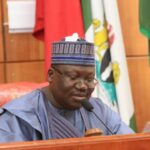The Socio-Economic Rights and Accountability Project (SERAP) has sent Professor Mahmood Yakubu, the Chairman of the Independent National Electoral Commission, INEC, a request to “widely publish the reports on the accounts and balance sheet of every political party submitted by the Independent National Electoral Commission (INEC) to the National Assembly since 2015.”
SERAP urged him to “urgently examine the books and records of political parties’ financial transactions, and to make the results of any such examination public.
“Provide details of the guidelines and steps that INEC is taking to prevent vote-buying in the upcoming elections in Ekiti and Osun states, as well as the general elections in 2023,
“Provide details of the guidelines and steps that INEC is taking to prevent vote-buying in the upcoming elections in Ekiti and Osun states, as well as the general elections in 2023, and to prosecute vote buyers and other electoral offenders,” SERAP added.
The opposition Peoples Democratic Party (PDP) received N40 million for its presidential form for the 2023 election, while the ruling All Progressives Congress (APC) received N100 million. Some of the country’s most powerful political parties and politicians spend anywhere from N250 to N14,000 to buy votes.
“Nigerians have the right to know about the accounts and financial transactions of their political parties, especially major parties with a strong possibility of assuming government in the future,” SERAP deputy director Kolawole Oluwadare wrote in a letter dated May 21, 2022.
“It is important to achieve greater transparency in public life, curb the influence of money in politics, promote a level playing field, and remove risks to the independence of political actors and would-be public office holders,” according to SERAP.
“Paying citizens to vote for a particular political party or candidate is both immoral and illegal,” SERAP added.
Vote buying and other electoral offences that go unpunished will continue to undermine good governance, the rule of law, moral values, and citizens’ participation in elections.”
“When a political candidate decides to buy people’s support rather than compete fairly for their votes, there are chances that such candidate will show a disregard for democratic rules, and a disposition to use illegal means becomes inevitable,” the letter stated.
“Vote buying and other electoral offences encourage bad governance and erode citizens’ ability to hold their elected officials accountable.”
“SERAP urges you to take immediate action and work with appropriate anti-corruption agencies to ensure the effective prosecution of any outstanding cases of vote buying and related electoral offences allegedly committed during the 2019 general elections.”
“We would appreciate it if the suggested actions were taken within 14 days of receiving and/or publishing this letter. If we have not heard from you by that time, SERAP will consider legal action to compel INEC to comply with our request in the public interest.”
“The lack of transparency and accountability in political finance undermines the legitimacy and credibility of democratic and electoral processes, denying citizens their right to effective participation in their own government.”
“If political parties fail to comply with transparency and accountability frameworks, citizens’ trust in their political parties will erode, and this lack of trust will inevitably erode confidence in the system, reducing citizens’ interest and participation in the democratic process.”
“Elections are only one part of the democratic process, and a fair and effective electoral system requires adequate democratic infrastructure and political leadership responsibility.”
“Several political parties, according to our information, have failed to submit their annual financial statements to INEC for many years.”
Many political parties have failed to file election expense reports with the Commission, as well as to disclose material contributions received from individuals and corporations.”
“In addition, the Commission appears unable or unwilling to monitor, examine, and publish these financial statements.”
“Also, it was reported that some leading political parties, politicians, and other political actors paid between N250 and N14,000 to buy votes.
For many years, allegations of vote buying (the payment of cash or gifts in exchange for voting) and other electoral offences have characterised the country’s elections and party primaries.”
“Despite several provisions of the Electoral Act (as amended), anti-corruption laws, and the country’s international anti-corruption obligations, suspected perpetrators of vote buying and related electoral offences frequently avoid justice.”
“However, INEC has consistently failed to exercise its powers and provide the leadership necessary to facilitate and ensure collaboration with appropriate anti-corruption agencies, as well as the arrest and prosecution of suspected perpetrators.”
“Every political party must submit to INEC a detailed annual statement of assets and liabilities, as well as an analysis of its sources of funds and other assets and a statement of its expenditure, as required by Section 86(1) of the Electoral Act 2022.”
Failure to comply is a violation of Section 86(2), which carries a penalty of six months in prison or a fine of N1,000,000, or both.”
“Under Section 86(3)(4), INEC has the authority to examine any political party’s records and audited accounts, and to publish the results of such examinations and audits in two national newspapers and on the Commission’s website within 30 days of receipt.”
“Section 226 (1) of the Electoral Act 2022 also requires INEC to prepare and submit a report on each political party’s accounts and balance sheet to the National Assembly every year.”
INEC has the authority to give directions to political parties regarding their books or records of financial transactions under Section 225(5).”
“All qualified citizens have the right to vote in state and general elections, as guaranteed by the Nigerian Constitution and international standards.”
“A democratic society’s right to freely vote for the political party and candidate of one’s choice is fundamental, and any restrictions on that right strike at the heart of representative government.”
“The effective exercise of qualified Nigerians’ right to vote in the election of those who make and enforce the laws that govern their lives as good citizens can contribute to the enjoyment of other human rights, such as corruption-free public services, freedom of expression, and digital and data rights.”
“Public trust in voting systems is a necessary component of a full and healthy democracy.”
“The failure to arrest and prosecute suspected perpetrators of vote buying and related electoral offences may undermine public confidence in the country’s elections and lead to widespread discontent with the electoral process.”



